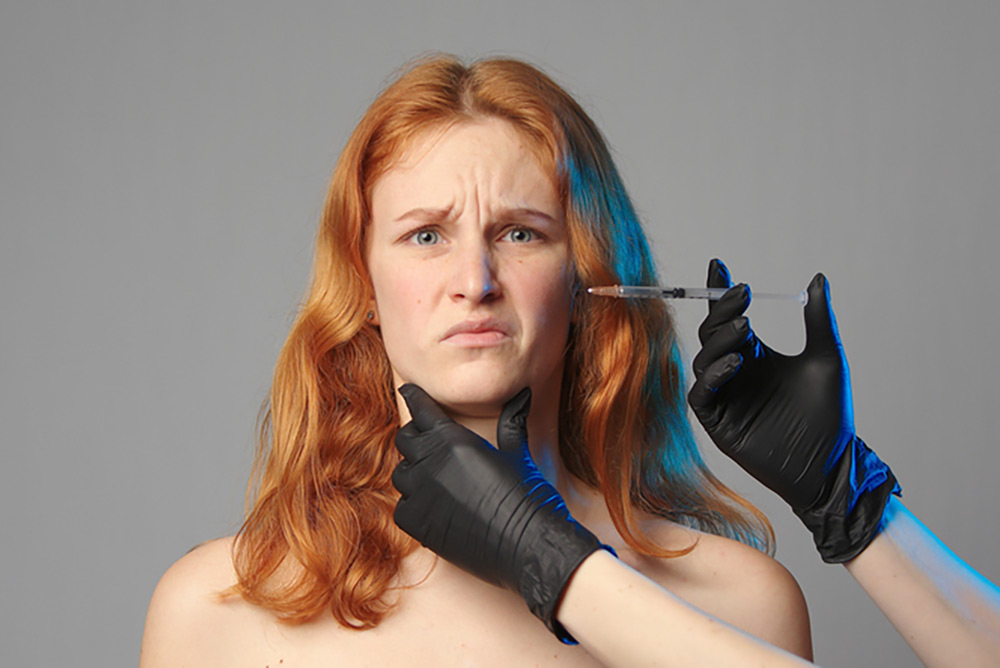By Valerie Monroe
If you’re interested in feeling happier about your appearance—especially as you age—you might like reading what she has to say about it. For more of her philosophical and practical advice, subscribe for free to How Not to F*ck Up Your Face at valeriemonroe.substack.com.
WE BEGIN today with an email I received in response to last week’s post about a 30-year-old woman who was contemplating getting neurotoxin injections to fend off “impending fine lines.” So many of you wrote in to express your feelings about her conundrum; you were, as usual, both compassionate and strong-minded.
Soon after that post went up, a young woman emailed me to share her fear that she’d already f*cked up her face with Botox injections. Her story adds another perspective to our “baby Botox” questions.
Q: I love reading your newsletters, especially as a 33-year-old who generally hadn’t been concerned about aging until I hit 32. I got Botox in my forehead and in my masseters [jaw muscles] and I’m so worried the result actually f*cked up my face. What I learned from doing the forehead Botox is that my elastic and varied facial expressions are my favorite things about my face, and now my eyebrows don’t move in unison . . . even after it seems the Botox has mostly worn off. And although the masseter Botox was the only thing that has ever helped my TMJ, my smile now looks entirely different to me than it did a year ago. I don’t like it. Is there any way to reverse this? I’ve begun using a NuFace and hoping it will stimulate the frozen muscles, but is there anything else? Should I resign myself to the fact that this is permanent?
A: First, dear E, thanks for trusting me with your question. The good news is the neurotoxin will wear off; how long that takes depends on the type that was injected and your body chemistry. So be patient; I’m pretty sure there are no neurotoxin results that last more than approximately six months.
Most important, though, I think you should have a conversation with a board-certified dermatologist or plastic surgeon. They can reassure you that the effects aren’t permanent. That’s one thing. Another is that it’s helpful to remember no one sees you with the critical eye with which you see yourself. What might seem like a visible difference to you may not be noticeable to anyone else. Lastly, NuFace isn’t likely to make a difference whether you’ve had neurotoxin or not; you can read what I wrote about it (and other microcurrent devices) here.
My advice: Relax. Make an appointment with a physician to get clarity (and to calm your fears). Then, take advantage of the terrifically important lesson you learned about your face. How lovely to discover it at only 33!
✨ ✨ ✨
As I was writing that response, two other young readers posted in the comments:
As a 37-year-old who’s had a frozen forehead for the past seven years due to medical Botox, I hate it! It’s changed my smile and I worry my facial aging will look “off.”
And then:
I’m 40 and have been doing Botox on my forehead and in between my eyes for about two years. I’m “due” for my next round next week and am really struggling with whether to cancel the appointment. Sometimes, I think the Botox just moves the wrinkles to other places. My face is like “Oh, I can’t scowl at people anymore? Fine, I’ll pop up some weird wrinkles on the outside of your eyebrows then.” I’m not much of a social media follower, but every other 40-year-old woman is—and they all do Botox. And many of the women in my family (including my 62-year-old mom and 32-year-old sister) do Botox. I really don’t know what “normal” aging looks like. I do know I’m tired of spending the money, but I’m also scared of looking like I haven’t “aged well” (with all the moral judgment that implies). Quite the conundrum.
I suggested both readers also bring their concerns to either a board-certified plastic surgeon or dermatologist; as I wrote to the second reader, if they’re a skillful, experienced physician (and a good listener), they might be able to assuage your worry and help you find a more comfortable schedule for treatments (or none at all). As for looking like you’ve “aged well,” make sure a broad-spectrum sunscreen is on your agenda; it’s the most effective treatment for healthy skin. Everything else is . . . optional.
But the obvious, larger question here is about social pressure. If you, wise readers, have more thoughts about this, please share them. I have more to say about what aging “well” looks like. I’ll share that as soon as I can make sense of it.
And now, another question that left me so thoroughly confused, I knew I needed to call an expert ASAP. Turns out, the answer was relatively simple.
Q: I’ve run across influencers on social media (maybe they’re part of the de-influencer movement?) warning that the GrandeLASH brow and lash serum I’ve used for years is dissolving the subcutaneous fat around my eyes. To be honest, the area around my eyes has noticeably aged, but I just attributed that to living longer. I don’t want to melt away important orbital plumping tissue, so I plan to give it up if I must. I just don’t want to go back to skimpy lashes and brows if I don’t have to and I don’t know what to believe. Help!
A: I’ve seen a dermatologist who used the prescription product Latisse for years; she (happily) lost so much periorbital fat, it looked like she’d had an eye job. So, anecdotally, I know it can happen. The fat loss is due to the effect of bimatoprost, a prostaglandin analog found in Latisse. Another prostaglandin analog called isopropyl cloprostenate is often found in over-the-counter products (that’s the one in GrandeLASH), so your concern is not unfounded.
“Most people tolerate the formulas containing prostaglandin analogs (like in Latisse and GrandeLASH) without problems,” said HNTFUYF DermDiva Heidi Waldorf. “The most discussed complication—discoloration of the pupil—is actually rare. More common side effects are eye and eyelid irritation and redness.” Waldorf concedes that fat atrophy may also occur; for some, it reduces unwanted fat pads. But for others, the area around the eyes can become hollow-looking. If you’re in the latter camp and don’t want to forsake fuller lashes and brows, she suggests an alternative: topical serums containing peptides. Her favorite is Nulastin. You can find more of her recommendations and suggestions in an archived post about lash serums here.
It seems like time for a reminder about how we might learn to see ourselves through a kinder lens. I so wish you all understood how beautiful, how perfectly imperfect, I know you are.



